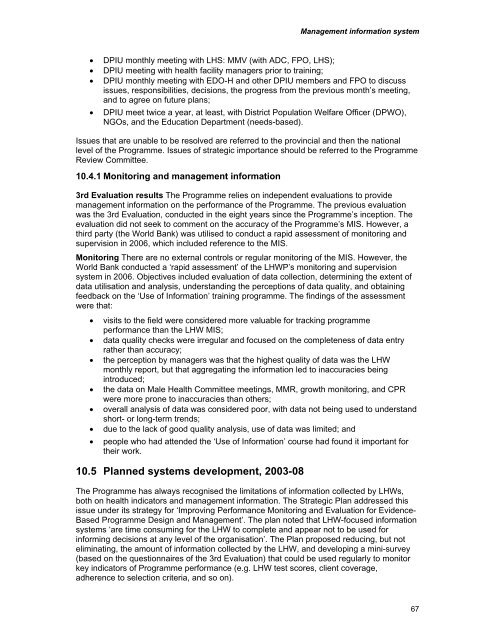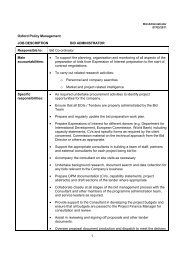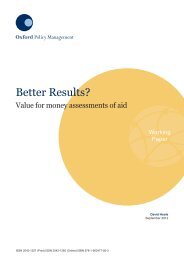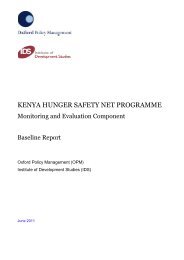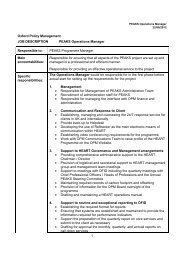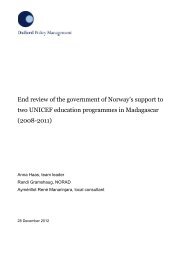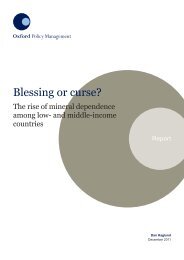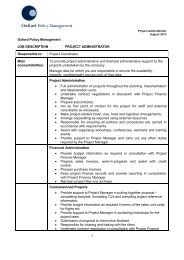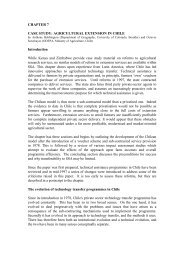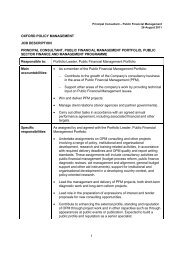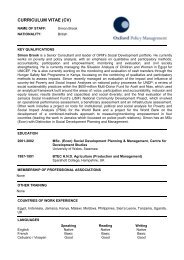LHW Systems Review - Oxford Policy Management
LHW Systems Review - Oxford Policy Management
LHW Systems Review - Oxford Policy Management
Create successful ePaper yourself
Turn your PDF publications into a flip-book with our unique Google optimized e-Paper software.
<strong>Management</strong> information system• DPIU monthly meeting with LHS: MMV (with ADC, FPO, LHS);• DPIU meeting with health facility managers prior to training;• DPIU monthly meeting with EDO-H and other DPIU members and FPO to discussissues, responsibilities, decisions, the progress from the previous month’s meeting,and to agree on future plans;• DPIU meet twice a year, at least, with District Population Welfare Officer (DPWO),NGOs, and the Education Department (needs-based).Issues that are unable to be resolved are referred to the provincial and then the nationallevel of the Programme. Issues of strategic importance should be referred to the Programme<strong>Review</strong> Committee.10.4.1 Monitoring and management information3rd Evaluation results The Programme relies on independent evaluations to providemanagement information on the performance of the Programme. The previous evaluationwas the 3rd Evaluation, conducted in the eight years since the Programme’s inception. Theevaluation did not seek to comment on the accuracy of the Programme’s MIS. However, athird party (the World Bank) was utilised to conduct a rapid assessment of monitoring andsupervision in 2006, which included reference to the MIS.Monitoring There are no external controls or regular monitoring of the MIS. However, theWorld Bank conducted a ‘rapid assessment’ of the <strong>LHW</strong>P’s monitoring and supervisionsystem in 2006. Objectives included evaluation of data collection, determining the extent ofdata utilisation and analysis, understanding the perceptions of data quality, and obtainingfeedback on the ‘Use of Information’ training programme. The findings of the assessmentwere that:• visits to the field were considered more valuable for tracking programmeperformance than the <strong>LHW</strong> MIS;• data quality checks were irregular and focused on the completeness of data entryrather than accuracy;• the perception by managers was that the highest quality of data was the <strong>LHW</strong>monthly report, but that aggregating the information led to inaccuracies beingintroduced;• the data on Male Health Committee meetings, MMR, growth monitoring, and CPRwere more prone to inaccuracies than others;• overall analysis of data was considered poor, with data not being used to understandshort- or long-term trends;• due to the lack of good quality analysis, use of data was limited; and• people who had attended the ‘Use of Information’ course had found it important fortheir work.10.5 Planned systems development, 2003-08The Programme has always recognised the limitations of information collected by <strong>LHW</strong>s,both on health indicators and management information. The Strategic Plan addressed thisissue under its strategy for ‘Improving Performance Monitoring and Evaluation for Evidence-Based Programme Design and <strong>Management</strong>’. The plan noted that <strong>LHW</strong>-focused informationsystems ‘are time consuming for the <strong>LHW</strong> to complete and appear not to be used forinforming decisions at any level of the organisation’. The Plan proposed reducing, but noteliminating, the amount of information collected by the <strong>LHW</strong>, and developing a mini-survey(based on the questionnaires of the 3rd Evaluation) that could be used regularly to monitorkey indicators of Programme performance (e.g. <strong>LHW</strong> test scores, client coverage,adherence to selection criteria, and so on).67


